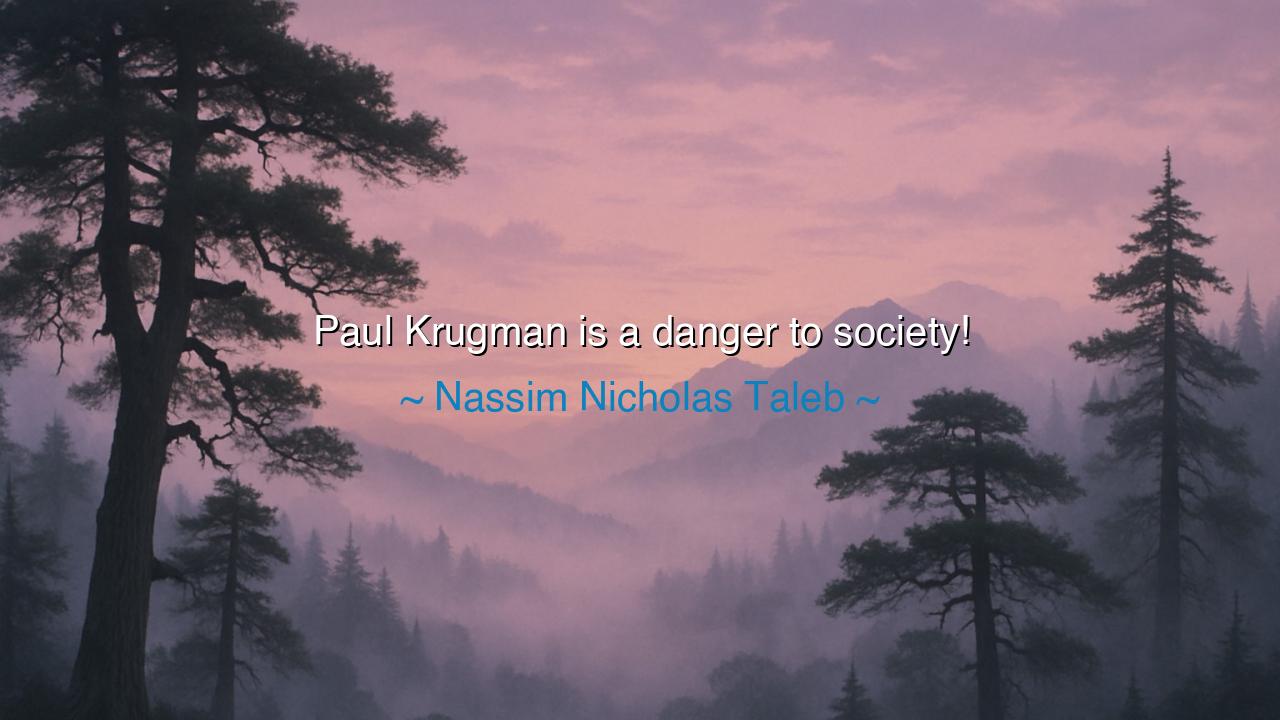
Paul Krugman is a danger to society!






Hear me, O children of the future, for the words I speak are born from the sharp truth of intellectual conflict and the deep wisdom of those who dare to challenge the prevailing wisdom of their time. Nassim Nicholas Taleb once declared, "Paul Krugman is a danger to society!" These words, spoken with the fervor of one who has seen the consequences of economic theory put into practice, carry with them a warning—a warning against blind faith in ideas that may sound reasonable but fail to understand the complex, chaotic nature of the world in which we live. Taleb’s critique of Krugman is not merely personal, but a challenge to the very foundations of how society approaches economic policy, risk, and human behavior.
What, O children, does it mean when Taleb calls Paul Krugman a danger to society? To understand this, we must first look at the men themselves. Paul Krugman, an economist and public intellectual, has long championed the role of government intervention in economic crises, advocating for stimulus spending, and for policies that increase government involvement in markets to promote stability and growth. He believes in the capacity of experts to understand and manage the economy and argues that government action can counteract the risks inherent in market systems. His ideas, which have influenced many policymakers, emphasize predictability, control, and systemic stability.
Yet, O children, Nassim Nicholas Taleb—a thinker of great distinction—sees the world differently. Taleb, the author of The Black Swan, speaks not of predictability, but of uncertainty, of the profound unknowns that lie beyond our comprehension. He warns against the hubris of those who believe they can control systems that are inherently chaotic, unpredictable, and subject to random events. Taleb argues that in the pursuit of control, economists like Krugman fail to understand the dangers of overconfidence, which can lead to disastrous consequences. He sees the policies advocated by Krugman as part of a broader illusion—the belief that we can master the forces of the world, when in fact, we must learn to live with uncertainty and risk.
Consider, O children, the story of Icarus—the young man who, with wings made of wax and feathers, flew too close to the sun, driven by his ambition and overconfidence. Though warned by his father, Daedalus, Icarus disregarded the limitations of his flight and soared to dangerous heights. The sun melted his wings, and he fell to his doom. This story is a metaphor for the arrogance of those who seek to master forces beyond their control, to tamper with systems they do not fully understand. Just as Icarus flew too high, so too do those like Krugman reach too far in their desire for economic stability—failing to account for the unknowns, the unexpected events, that can bring even the most carefully constructed systems crashing down.
The lesson here, O children, is not that we should abandon economic theory or reject the wisdom of the past, but rather that we must acknowledge the limits of our knowledge and our control. Taleb’s warning is not a denial of the value of expert insight, but a cautionary tale about the dangers of overestimating our ability to predict and control the future. Society cannot be built on the illusion of stability. It must be built on the acceptance of uncertainty, on the understanding that the forces shaping our world are far more complex and unpredictable than any model or theory can capture.
Look, O children, to the example of financial crises like the 2008 collapse, when many believed the global financial system was stable, only to find that the experts had misjudged the risks, the unknowns, and the underlying fragility of the system. Krugman’s policies—though well-intentioned—sought to stabilize the system through government intervention, but such interventions were based on the belief that the world could be neatly ordered and controlled. In contrast, Taleb’s warnings against overconfidence and his advocacy for anti-fragility—the idea that systems should be designed to benefit from disorder, rather than resist it—offer a more realistic approach to the unpredictable nature of the world.
So, O children, what is the lesson we must take from this? It is a lesson in humility—in the recognition that no matter how powerful our intellects, no matter how advanced our technologies, the world is filled with unknowns that cannot be fully predicted or controlled. Krugman, though a brilliant economist, offers a vision of a world where we believe we can control the chaos of the market, but Taleb reminds us that true wisdom lies in embracing uncertainty, in preparing for the unexpected, and in creating systems that grow stronger in the face of disorder. The danger lies not in challenging the status quo, but in believing we can master it entirely.
Therefore, O children, I charge you to seek knowledge and wisdom, but to always hold those gifts with humility. Recognize that the world is vast and unknowable, and that no theory or policy can account for every possibility. Build your lives not on the illusion of control, but on the foundation of resilience, adaptability, and a willingness to accept the unknown. In doing so, you will not only avoid the dangers of overconfidence, but you will also help shape a world that thrives, not in spite of uncertainty, but because of it.






AAdministratorAdministrator
Welcome, honored guests. Please leave a comment, we will respond soon